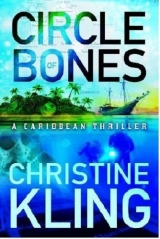
Текст книги "Circle of Bones"
Автор книги: Christine Kling
Жанры:
Триллеры
,сообщить о нарушении
Текущая страница: 7 (всего у книги 32 страниц)
CHAPTER EIGHTEEN
Aboard the Shadow Chaser
March 25, 2008
8:05 p.m.
The moon lit the sky from behind the volcano when they raised the anchor and motored out of Marigot Bay. Cole left Theo at the helm and slipped into his cabin. From the bottom of the hanging locker, he extracted a sheet metal box with a combination padlock on it. He set the box on his bunk, spun the combination and withdrew three worn leather journals. Inside the first two, every page was filled with his father’s neat printing. He knew because he had read them all many times. The first entry in the first journal was dated three days after Cole’s birth. Each entry started with the words, “Dear son.”
He’d still been busting his hump at East Carolina U when word came that his father had died at home in Cornwall. There were no details, which didn’t surprise him at the time. Communication with his father had always been a bit odd. Cole had been the result of a brief love affair and an even more brief marriage between an American nurse, Kara Greer, and a British business man, James Thatcher, twenty-five years her senior. Cole’s mother had told him that his father was not suited for family life, and she’d sent her husband back to England. It was not until the journals arrived in a package from Bodwin, England that he had learned his father’s side of the story.
He opened the first of the leather volumes and began to read.
Dear son,
Just received word from the states of your arrival three days past. You must take after your mother – quite punctual, that is. Any woman who could marshal that lot at her hospital could presumably have even got the Italian trains to run on time. Alas, all her attempts to tidy up my life went awry. Love does not conquer all. She’s a scientist, that one. Maybe unconquerable. She’s a queen from Amazonia, our Kara is, a warrior princess who has never needed a man for much. Could have been much more than a nurse, not to degrade her profession in any way, but she sees the world in the black and white of certainties – truth and falsehood and ne’er shall anything dwell between. That, my boy, is where I think life begins to get interesting. In the ‘tween.
-JT
Cole closed the leather cover and sighed. He wondered how it was possible he could have ended up so much like this father he never knew. He had thought when he went to school to study marine science that he was following his mother’s first love: science. But when he enrolled in graduate school to study Maritime Archeology, he had shifted over to his father’s world in the ‘tween – the world of suspicions and rumors, conspiracies and plots. The shadowy world of dreams.
And the day these journals arrived, Cole had learned how far into the ‘tween his father had gone. Theories only remain theories until someone proved them right or wrong. James Thatcher hadn’t been given the chance to do that, but he’d sent his words on to his son. And the more Cole read, the more he, too, became a believer, not only in the theory, but in the idea that it was his father’s search for the truth that had got him killed.
“Hey Cole, you want me to take her into the cove?” Theo called out from the helm.
“Hang on. I’m coming.” He slid the journals back in the box, locked it and returned it to its place in his cabin.
Little more than two miles down the coast from Marigot Bay, Cole eased the big vessel in close to shore while Theo stood out on the bow with a hand-held spotlight. The younger man panned the light down the beach but there was no sign of the Whaler.
Cole stuck his head out the wheelhouse door and asked Theo to come take the con.
After the younger man had taken the wheel, Cole went alone onto the foredeck and searched the beach with the spotlight himself. No doubt about it. The Whaler was gone. He shut off the light and sat in the darkness for several minutes, contemplating how he was going to continue diving with nothing but that rubber ducky of a dink. They had no more money. He wasn’t even sure what he was going to do when they ran out of fuel. Finally, he stowed the spotlight and returned to the wheelhouse.
Theo sat in the comfortable chair in front of the wooden ship’s wheel, his feet propped up on the console above the helm. Over his head, several screens glowed including a computer GPS chart plotter, radar, and a down-imaging sonar/depth finder, while resting on his lap was a small laptop that could convert into a tablet computer. Theo’s fingers danced on the keys with the speed of a court reporter.
“Are you paying any attention at all to the con?”
“It’s called multitasking, my good man.”
“Take us out, then, Mr. Multitasker.”
“Aye, aye, Captain,” Theo said without removing his eyes from the tiny screen. “Back to Marigot, then?”
Cole stood in the doorway to the galley, his eyes bouncing from Theo to the chart to the radar. The vessel was turning and he heard the RPMs increase as the bow of Shadow Chaser cleared the land. Theo had not touched the wheel or the throttle.
“What the hell?”
Theo grinned. “You like my new toy?”
“You’re controlling everything from there?” Cole pointed at the laptop. “How?”
“The magic of wireless, my dear friend. I don’t even need something this big. I could do it from a Wi-fi enabled cell phone. Back to my question. What course, Captain?”
Cole shook his head. “Damn. You’re really something. The Saintes. We’re going to Bourges des Saintes,” he said, trying to make his mouth into the right shape to say the French words, but mangling it in the end.
Theo looked up from his computer, his eyes wide behind the glasses. “Really? Why? What about the journals? Surcouf? As you said, we’re getting close.”
“I told you – I saw the Brewsters going into Point-à-Pitre. I couldn’t take a chance that they’d see me on the streets. It’s got to be the coin they’re after. I had to hide it. I left it on her boat.”
Theo’s feet dropped to the floor. He flipped the laptop shut and slid it across the console. “You did what?”
“Don’t worry. She’ll never find it.”
“But what about us? Are we going to be able to find it?”
“No problem. We’ll find her, I’ll get aboard her boat and get it back.”
Theo threw back his head and started laughing, then he collapsed into the helmsman’s seat. He flipped open the laptop and began punching in waypoints, his shoulders still shaking.
“What?” Cole said finally.
“I got my answer. She was hot.”
CHAPTER NINETEEN
Pointe-à-Pitre
March 25, 2008
8:45 p.m.
“Monsieur?”
Diggory Priest heard the boy’s voice before he made out his shape at the bottom of the steps. The child scrambled up to the door of the Immigration offices dragging two aluminum oars. Diggory paid the urchin and the boy ran off into the night without another word.
From his high vantage point, Diggory leaned on the oars and considered how best to take advantage of the evening’s events. Across the Place de la Victoire, he noticed a man hurrying through the crowd, shoving people aside. He was wearing a red windbreaker over his T-shirt and frayed cut-off jeans. It was the bright color that had caught Diggory’s attention. The man rushed past an elderly couple who were coaxing a well-coifed tiny dog toward a patch of grass. The red-jacket man failed to see the dog until his leg tangled in the leash. The small ball of fur was whipped into the air and Diggory heard the high-pitched yelp from fifty yards away. The man turned, swearing in English, then kicked the dog airborne again while disentangling himself. He rushed on, leaving the elderly man shouting curses and the woman bending over the whimpering fluff.
By the time Diggory reached the sidewalk, the barbarian had already disappeared into the Rue Victor Hugo. He recognized the man from a photo Caliban had shown him. Diggory allowed him to get ahead and disappear among the pedestrians, autos and motorbikes that jostled along the narrow street. The man’s destination, Le Mambo, was a small bar up an even darker alley, the place where Diggory was supposed to meet him at eight – in fifteen minutes.
Maggie Riley would have to wait.
Le Mambo had once been a back street dive, but it had now been discovered by a younger French crowd. Dig squeezed past a voluptuous woman standing in the narrow doorway. She was trying to talk into a cell phone without dislodging the largest hoop earrings he had ever seen. Her white blond hair was molded into dozens of short, sharp spikes. When she paused, she stuck a cigarette between her lips and sucked until the end of the butt grew cherry red and her cleavage swelled.
Once inside, Diggory waited for his eyes to adjust to the minimum light provided by the few red-tinted bulbs that hung from the ceiling on wires. The tables were only half-filled as it was still quite early for the French. The clientele tended toward the pierced nose and leather crowd, and the music pounding out from the large black speakers was the frenetic Franco-Caribbean pop they called zouk.
The man he was looking for was sitting at the corner of the bar with his back to the door, the red windbreaker appearing almost black under the red lights. It was obvious he was a mongrel, a mixed breed. His skin, or what Diggory could see of it round his neck, looked more gray than brown and his dark frizzy hair was pulled back in a ponytail. Along his face hung several long thin braids with cowry shells knotted into the plaits.
Diggory leaned the oars against the bar and slid onto the stool around the corner from the windbreaker man. He rested his arms on the bar, his steepled fingers very close to the barbarian’s sweating glass of beer.
When the man turned to face him, Diggory was amused to see a silver skull and cross bones hanging by a chain through his left ear.
“D’ya mind?” the man said.
“I beg your pardon?”
“I said, d’ya mind? Stay on your own fuckin’ side of the bar.”
Dig did not move. “Caliban told me I’d find you here.”
“Shit. Why didn’t ya say so.” The man tipped up his glass and drained his beer. Then he stuck out his hand. “Name’s Spyder, with a Y.”
Diggory ignored his hand as the bartender approached. He was an effeminate black man with hair shaped like abstract topiary and contact lenses that tinted his eyes an unnatural green. He asked Diggory if he wanted a drink.
“He don’t speak nuthin’ but French,” the barbarian said. “I tried.”
Diggory ordered a glass of red wine which he had no intention of touching. Then he turned to the American and spoke in English. “We hired you to do a job.”
“Hey, I got this shit under control. We got the guy’s dinghy.”
“No, you do not have this shit under control, do you?”
The man gave Diggory a puzzled look. “What d’ya mean?”
The bartender set the glass of red wine on the bar. Priest waited until he moved away before continuing. “I noticed you crossing the square from over one hundred feet away. You attract too much attention. This is a quiet business. Covert. Do you know what that means?”
“Are you calling me stupid?” the man asked, his words loud enough to be heard over the music from across the room.
“Lower your voice. Yes, I am calling you stupid. I also asked you a question. You don’t know what covert means, do you?”
The cheek on one side of the man’s face bulged as his tongue explored the molars behind his brown-colored front teeth. He ignored Diggory.
“Covert means secretive. Hidden,” Dig said. “We don’t want to broadcast to everyone what we are doing here. You want to blend in.” He felt like he was talking to one of the rodents roaming the streets. They would have understood him just as well. He pinched the nylon fabric of the man’s windbreaker between his fingers. “Red is not a color for someone who does not want to be noticed. Pushing people out of the way, kicking their dogs – this is not good practice for someone who does not want to be noticed. Are you getting my drift here?”
The barbarian refused to look at him. He stared at his glass and said, “Yeah.”
“I want you to follow orders, now. My orders. Do you understand?”
“Yeah.”
“Look at me when I speak to you.”
The man ran his fingers across his two-day growth of beard, and Diggory saw that every finger was tipped with a crescent of black dirt under the fingernail. The man swiveled his head around and met Diggory’s eyes. His pupils were huge black pools.
“There’s a woman,” Diggory said. “I want you to follow her.”
“But that Caliban guy said he wanted me to snatch the doc, get the coin.”
“And you were so successful at that.”
“Hey, I said I got it under control.”
Diggory did not say anything for almost a minute. He kept his eyes on the other man’s face and watched the barbarian grow more and more uncomfortable. A last, he said, “Do you understand that you work for me?”
The red windbreaker man looked away and signaled for the bartender to bring him another beer. When he spoke, he did not look at Dig. “Yeah, I got it.”
“You will do exactly what I tell you to do, and you will stop making these feeble efforts to think for yourself.” Diggory gave the man a description of Maggie Riley and told him she was sailing a white-hulled boat about thirty-five to forty feet in length anchored just off the red light in the entrance channel. “The boat might be named Bonefish.” Diggory remembered her telling him about her dream of owning a boat and naming it after the vessels she had sailed with her brother.
“I want you to locate the boat tonight, and —” Diggory twisted around and picked up the oars. He handed one to the other man and rested the remaining oar across his knees. The oars were designed to be taken apart for easier stowage. A small button protruded where the two halves of the oars joined and when Diggory pressed it in with his thumb, he was able to slide the two aluminum tubes apart. “I want you to leave these on her deck without her knowledge,” he said as he pulled out a small object that looked like a silver AA battery. He slid it into a small ziplock bag, then using several napkins from the pile on the bar, Diggory stuffed the wrapped device into the oar and connected the tubes once again. He held the second oar out to the barbarian.
The man started to take it, then hesitated. “That ain’t a bomb, I hope.”
“No, it’s not a bomb. I don’t want her to know who left the oars. Understand?”
“Yeah, right. Covert.”
“Call in twice daily.” Diggory slid a slip of paper across the bar.
The man picked up the paper and looked at it as though it were written in an undecipherable code. “Call you? But that dude Caliban said —”
“Yes. Call me. Once in the morning, once at night. Stick with her. Tell me where she is and what she’s doing. But do it covertly.”
“And what about the other —”
Diggory lifted his palm to hush the man. “No questions, no thinking for yourself. You work for me now. Do you understand?”
The man shrugged and shoved the paper into a pocket of the nylon windbreaker. Tipping up his glass, he drained the beer, his Adam’s apple bobbing between the taut tendons in his neck. Then he left without another word and without leaving any money.
Filth, Dig thought. He’d always disliked using non-professionals for anything other than information, but it came with the job.
When he was on his way out the door, past the woman with the earrings who was still talking on her cell, Diggory felt his own phone vibrate in his pocket. He stepped away from the doorway and started down the street. Once he was alone, he pulled out the phone and looked down at the glowing screen. He recognized the number as that of the German school teacher from the night before. An image of her naked body flashed in his mind and he stopped walking. There were reports to write and arrangements to be made for the surveillance. And he remembered how this teacher was both exceedingly limber and inventive, and when he’d told her what he wanted the previous night, she’d viewed it as a challenge. With a flick of his wrist he opened the phone and pressed it to his ear.
CHAPTER TWENTY
The Atlantic south of Bermuda
February 12, 1942
The captain swung the torch beam around the compartment and fixed it on each man. As the three Brits stared at him in silence, he raised his arm and wiped his face on his sleeve, which only served to smear the blood and make him look worse.
“My men want to go home,” he said in heavily accented English, “but my orders were for Panama.” The French Captain shrugged. He appeared smaller, deflated.
Woolsey felt his mouth open to answer the man, then he realized he had never spoken to the Captain without the benefit of Henri Michaut’s translation. “You speak English?” he asked.
The Captain continued as though Woolsey had not spoken. “Who can blame them? The worst thing about putting into port is that we get mail. With news from home, their families tell them that life in occupied France is not so bad. They have mothers, girlfriends,” he shone the light on Mullins, “and boyfriends. So, we are now headed for Martinique.”
It was obvious, he spoke the language damn well. Thinking back, Woolsey wondered how many times he and the other Brits had spoken freely in front of the old man thinking he didn’t understand a word.
“So the Frog crew gave you the boot, eh Capt’n?” McKay spoke from deep in the depths of the hold.
“What does this mean, the boot?”
“Mutiny, Mate.”
“Ah, yes, this is the word. They intend to surrender to Admiral Petain in Martinique.”
“How long will it take —” Woolsey began.
McKay barked out a laugh. “Fuckin’ Hooray.”
Lamoreaux ignored him. “It is just over one thousand miles to Fort de France. Our electric motors are still giving trouble so we must stay at the surface. It would be too dangerous to dive. At the surface, the best we can do is ten knots.”
Woolsey didn’t have to know much about ships to do that math. Two hundred forty miles a day meant it was at least four days to Martinique. They didn’t have one.
Lamoreaux was rummaging about in the cases of wine bottles, the torchlight making the shadows dance on the bulkheads.
“Captain, may I have a word?”
“Ahhh, voila, c’est ici,” the Captain whispered to himself. He produced a sommelier’s knife and corkscrew, sat down on a crate and began to open a bottle. The loud pop of the pulled cork brought McKay out of the shadows. The Captain handed him the bottle and went to work on another.
Woolsey thought McKay sober was bad enough. “Captain, Sir, I’m not sure that’s such a good idea. We need to keep our wits about us.”
After taking a drink from the bottle in his hand, Lamoreaux looked up at Woolsey and studied him for a moment. “I do not think you understand the situation.”
“I know I’m not ready to give up. There’s got to be something we can do. Surely some of your men remain loyal to you.”
Lamoreaux closed one eye and looked up at the ceiling with the other. He appeared to be running through the list of men in his head. At last, he spoke. “No, not a one.” He took a long pull on the bottle.
Woolsey knocked the bottle out of the man’s hand, and it broke when it hit the deck a few feet away. The sharp, fruity smell of the wine filled the compartment.
“Lieutenant, that was not wise. There is not so much wine here as you might think. Not for what we need.”
What was the man talking about? There were cases and cases of wine. “Captain, you can’t sit here and get pissed while your men take over your command. Get hold of yourself, man. There are four of us here. We can overpower the guards next time they come in. This is your boat.”
Lamoreaux had reached for another bottle and was in the process of screwing the metal coil into the cork. He paused. “Lieutenant, there is no way that the four of us are going to succeed against one hundred and twenty-five men. Either, they are going to feed us to the sharks en route, or they are going to send you three to prison camps and they will hang me for treason – for joining DeGaulle. My boat – the Surcouf, the pride of the French Navy will go off with the Huns. You don’t think that is enough reason to get drunk?”
“Captain, there is something aboard this boat that your men know nothing about.”
Lamoreaux set the bottle aside and aimed the torch beam on Woolsey. “You know? What is this?”
“This thing, Captain, involves a third possible fate for us all – and it will sink your precious boat.”
“What are you talking about?”
“Captain Lamoreaux, there is a bomb on this boat and it is going to go off in about twenty hours.”
The captain threw back his head and laughed. “Psshht. Lieutenant. For a moment I thought you really knew something secret about my boat. But this? Non. You cannot trick me into trying something with you English.”
“This is no trick, I assure you, Captain. I set the thing myself.”







